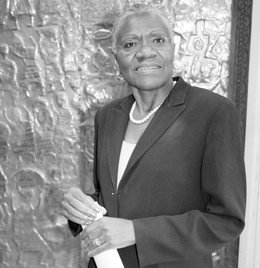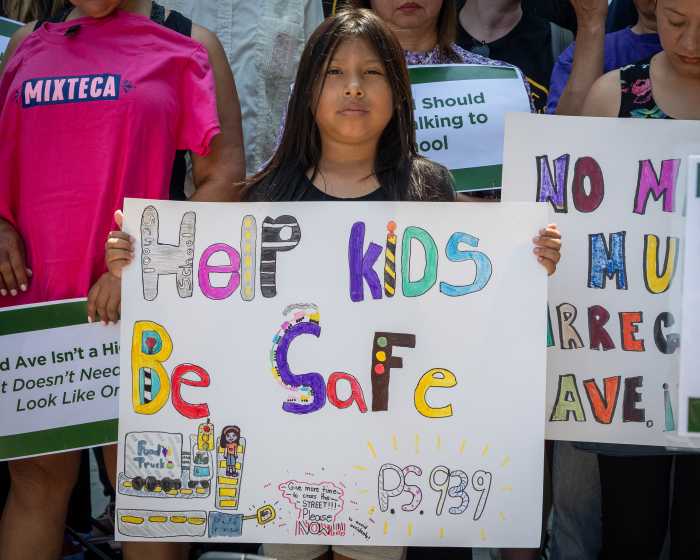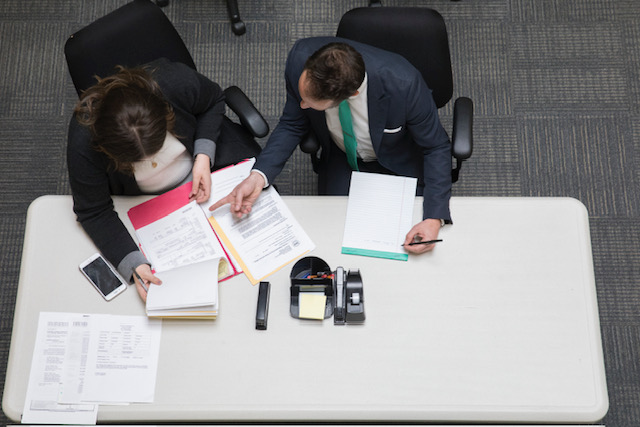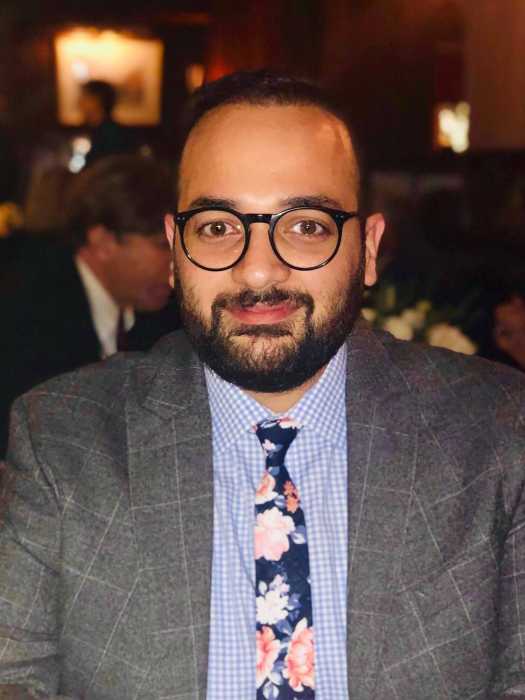C. Virginia Fields pushes to move up to the city’s CEO position
“I don’t think it is necessary to compare… to compare oppression of one group to any other,” said C. Virginia Fields, the Manhattan borough president deliberately, carefully choosing her words, before opening up a more flowing cadence. “Oppression, denial, discrimination, homophobia, racism, anti-Semitism. All of it is wrong.”
And then more calmly again: “And that’s really how I approach it.”
The Democratic mayoral hopeful, during a light breakfast Monday morning at Junior’s restaurant in Brooklyn, was responding to a question about whether she ever faced flak from other African-American leaders for her willingness to discuss gay and lesbian rights in the context of her personal experiences as a black woman who came of age at the height of the civil rights movement.
Having eschewed the notion that she is making any sort of direct comparisons, Fields proceeded to recall her own history.
“I can certainly talk from my own personal experiences, of what I went through, the struggles of growing up in the segregated South where I was denied opportunities based purely on the color of my skin,” she continued. “Where we lived, where we went to school, where we went to church. Where our parents worked if they were able to work because of color. I know what it did in terms of trying to instill in the minds of those of us of color that we were inferior, that we had no rights, that we could not and should not expect any more and I saw the devastation that it had on a lot of people’s lives. Fortunately, for me, I had a mother who always instilled in me that I could do and be anything I wanted to do or be and that’s the kind of strength you really need in those kind of situations.”
Having experienced that youth, 17-year-old Virginia Clark decided, in 1963, to march with Dr. Martin Luther King Jr. as he led an anti-segregation campaign in her hometown of Birmingham, Alabama. Her involvement landed her in jail for six days, but it was only in response to a follow-up question that she mentioned that it was during this incarceration, that she shared with many others, that King wrote his famous “Letter from Birmingham Jail” that ranks with the writings of Mahatma Gandhi and Henry David Thoreau as seminal works in the literature of civil disobedience.
Hearing this account for the first time, it was hard to avoid the thought that this girl who left behind the segregated South to become one of the most powerful women in New York City’s government, who was attracted professionally first to a career as a social worker to continue the legacy of her early lessons in the civil rights movement, was somehow under-telling this story, not milking it for all the political significance it might carry for a listener.
Yet, throughout a 45-minute interview, the borough president—even while spelling out a determinedly progressive political agenda with a deep-seated, almost New Deal-style faith in the good that government can do for its citizens—held back from flashy assertions that could easily have been made, if not perhaps for some constitutively-driven caution that she brings to her work in public life.
Fields wrapped up the story of her experience in civil rights activism, neatly and matter-of-factly bringing the discussion back to her support for gay and lesbian equality.
“Those experiences of growing up there and being a part of the civil rights movement put me on the path of fighting against injustices that I have continued to do for the rest of my life,” she said, “so it doesn’t matter whether we’re fighting against homophobia, anti-Semitism, racism—all of it is wrong.”
Like her Democratic rivals—former Bronx Borough President Fernando Ferrer, City Council Speaker Gifford Miller, and Brooklyn Congressman Anthony Weiner—Fields is in substantial, if not complete, agreement with all of the leading civil rights goals of the city’s LGBT community. Yet, even as she addressed the specifics, her own deliberate manner came to the fore.
“What I said at the time is still the case. I would not have taken the case to court,” she said of Mayor Michael Bloomberg’s decision to appeal a February ruling from a Manhattan State Supreme Court justice ordering the city clerk to issue same-sex marriage licenses. “I thought that Judge [Doris] Ling-Cohan issued a very comprehensive and detailed report and it would have allowed New York City to really take the leadership on that issue, and allow us to open the door and make it possible for others to follow our lead.”
Would she yank back the city’s appeal if elected?
“It would depend at this point, on becoming mayor, quite frankly, the status of it in the legal process,” she said. “But I certainly would be open to looking at the status of it.”
But then pressed on whether having marriages performed in the city before New York’s highest court considers the issue for the whole state might have value in advancing the cause, Fields seemed to be mindful of both the “chaos” that Bloomberg warned against in filing his appeal and the danger in being cast as an East Coast Gavin Newsom, San Francisco’s mayor.
“I don’t want to be in the position of having gay marriages performed only to be overturned if it is already in litigation,” she said. “I think when a case is in litigation such as this one, the steps you could have taken prior to litigation—and of course I wouldn’t have litigated this—are very different. But in the midst of it, to take actions that may be deemed unlawful, I think is a different question, a different question altogether.”
Asked about Bloomberg’s veto of the Dignity for All Schools Act—which would have enacted measures to keep track of and curb harassment and bullying based on a variety of motivations, including homophobia and transphobia—and his Department of Education’s refusal to implement the measure in the wake of the City Council’s override of the veto, Fields emphasized her work with a coalition of clergy from all faiths in tackling bias-related violence generally.
“I support the Dignity Act and thought it would have gone a long way in addressing issues of violence, homophobia, hate crimes and to move the city in a direction in our schools that I think is very important,” she said before mentioning her convening of the religious coalition in the wake of a racially-based attack in Howard Beach, Queens earlier this summer. “My approach is to bring people together from different backgrounds, faiths, religions, genders, sexual orientation. We are all represented there. Several leaders of the gay community are part of that coalition.”
She mentioned in particular the success that the Gay, Lesbian and Straight Education Network (GLSEN) and the Anti-Defamation League, members of her coalition, are having in developing specific interventions in the schools in partnership with an education department that she agreed overall is not doing enough.
Fields showed the most aggressiveness in discussing Bloomberg’s veto of the Equal Benefits Law, a measure championed by lesbian City Councilwoman Christine Quinn that would have required contractors doing business with the city to offer their gay and lesbian employees domestic partner benefits on par with those given to spouses. Asked about the mayor’s assertion that city procurement policies should not be used to advance social agendas, the borough president scoffed.
“The city is always doing social policy,” she said without skipping a beat. “I mean we do so much policy on a whole host of issues. So I think that is a real phony argument when you look at a number of legislative initiatives and policy initiatives where we often tie in decisions that are clearly related to social policy.”
Told that the mayor, responding to Gay City News’ Andy Humm immediately prior to the LGBT Pride March in June, said he would have taken the same view back in the 1970s and ‘80s when sanctions against businesses active in apartheid South Africa were adopted by the city, Fields seemed taken aback.
“To now know that the mayor has taken a position that he would have done differently is very disturbing and I can only say that I am so glad that he was not mayor at the time when that decision was being discussed,” she said.
Speaking about the Democratic primary race generally, Fields voiced considerable frustration that her candidacy has been tripped up by what
she termed “relentless media attention” toward the controversy over a flyer her campaign released, in which a picture of her speaking to a crowd was Photoshopped to incorporate an Asian couple not present at the event. Even as that flap continues, Ferrer seems to have moved beyond the damage he self-inflicted earlier this year when he pulled back dramatically from his criticism of police action in the shooting death of Amadou Diallo, an innocent African immigrant in the Bronx, in 1999 and Miller has escaped serious scrutiny over spending $1.6 million in Council funds on a mailing sent to most city households.
Fields has been critical of her rivals over these issues and this week comparing her misstep to theirs’ said, “It doesn’t reach the level of the other two incidents. One has to do with using public dollars. And the other one has to do with a position on an issue that clearly was something—still is an issue—of great concern to people on a number of levels—morally, spiritually, legally.”
The borough president, more broadly, believes her campaign has not received fair coverage from the media, and she was not shy about suggesting that this fact has to do with her gender.
“As a woman, I believe I’ve been treated different throughout this campaign,” she stated bluntly. “In terms of the coverage, the reporting of positions that I’ve taken… the lack of coverage I would say.”
Fields went on to itemize a host of issues on which her campaign has laid out detailed proposals, only to be met with widespread indifference. Citing her experience not only in eight years as borough president, but also eight years representing Harlem on the City Council, and on a local community board before that, she argued that she has accomplished much—bringing new life to a broad stretch of Frederick Douglass Boulevard in central Harlem by working in partnership with private developers; putting discussion of a Second Avenue Subway back on the table by working with New Yorkers in Congress to secure a federal budget line item for it and by allocating the first $1 million in funds to begin planning; and by laying out $20 million for public schools throughout Manhattan and encouraging a greater focus on excellence in math and science.
But the first of the accomplishments Fields pointed to in discussing her record was her lead role during this year’s campaign in discussing the need to fortify security on the city’s buses and subways. As she discussed the high profile issue of homeland security, the borough president was asked how, as mayor, she would reconcile her views with those of the Bush administration with whom the city’s chief executive and police departments must work closely and whose policies have attracted considerable criticism here in New York based on civil liberties considerations.
In response, Fields discussed her leadership with the National League of Cities on homeland security issues; on the need to empower citizens to be part of the efforts on the ground; on the need to provide security beyond the transit system to the airports, ports, tunnels, shopping districts, and even on Broadway; and most importantly, on the need to press the New York congressional delegation to secure more federal dollars for protecting a city that is full of high value terrorist targets.
C. Virginia Fields is aiming to lead the nation’s largest city and its largest police department at a time of considerable national anxiety. On this particular summer morning, she chose not to address the civil liberties controversies that have become so much a part of the ongoing national discussion.
gaycitynews.com



































